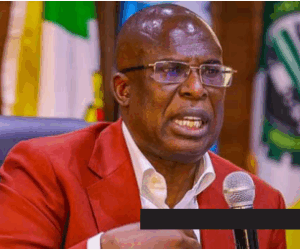1
For decades, the relationship between China and Africa has been the subject of considerable debate, often framed through the lenses of neocolonialism versus mutual benefit. While some Western perspectives emphasise potential debt traps and exploitation, a closer examination, particularly through the lens of China’s commitment to the Global Development Initiative (GDI), reveals a more nuanced reality: China is actively positioning itself as a steadfast partner dedicated to Africa’s sustainable development. ROLAND OGBONNAYA writes
The relationship between China and Nigeria, while relatively young compared to their respective histories, has blossomed into a significant partnership that shapes both countries and the wider African continent. Examining its historical perspective reveals a trajectory marked by shared experiences, evolving economic imperatives, and complex political considerations.
In the early years following Nigeria’s independence in 1960, China was a newly emerging communist nation, ideologically aligned with the anti-colonial movements sweeping across Africa. China’s staunch support for liberation struggles and its condemnation of Western imperialism resonated deeply with newly independent nations, such as Nigeria. This solidarity formed the bedrock of their diplomatic relations, officially established in 1971. Early interactions were largely characterised by political solidarity, with China providing scholarships, training, and technical assistance to Nigeria, especially in sectors like agriculture and infrastructure. These gestures were often framed within the context of South-South cooperation, emphasising mutual support and shared development challenges rather than traditional aid dynamics.
The post-Mao era in China and the subsequent economic reforms of the 1980s fundamentally shifted the dynamics of the relationship. China’s focus turned towards economic growth, and Africa became increasingly important as a source of raw materials and a market for its manufactured goods. Nigeria, with its abundant oil reserves and large population, became a key partner in this new economic calculus. The 1990s saw a significant increase in Chinese investment in Nigeria, particularly in infrastructure projects like railways, roads, and power plants.
However, this period also witnessed the emergence of criticisms. Concerns arose regarding the quality of Chinese-built infrastructure, the influx of cheap Chinese goods that undermined local industries, and the exploitation of natural resources with little regard for environmental consequences. These criticisms fuelled debates within Nigeria about the long-term benefits and drawbacks of the burgeoning Chinese presence.
The 21st century has seen the relationship deepen further. Trade volumes have exploded, making China one of Nigeria’s largest trading partners. Beyond infrastructure and natural resources, Chinese companies are increasingly involved in sectors like telecommunications, construction, and manufacturing. China has also provided significant concessional loans to Nigeria, funding major development projects. This closer relationship has been fostered by regular high-level visits and the establishment of various bilateral cooperation mechanisms.
Despite its growth, the China-Nigeria relationship remains complex. Concerns persist about the trade imbalance, the potential for debt traps, and the impact of Chinese activities on local communities. However, the Nigerian government generally views China as a crucial partner for economic development, offering an alternative to Western dominance and providing much-needed investment and infrastructure. As the relationship continues to evolve, it will be crucial for both countries to address these challenges and ensure a more equitable and sustainable partnership that benefits both populations. The historical context underscores the shifting motivations and consequences of this burgeoning relationship, highlighting the need for continued dialogue and careful consideration of its long-term impacts.
As Ambassador Jiang Feng, Head of the Mission of the People’s Republic of China to the African Union and Representative of China to the United Nations Economic Commission for Africa, and Yu Dunhai, Ambassador of the People’s Republic of China to the Federal Republic of Nigeria, emphasise, development is a fundamental right, not a privilege. Premier Li Qiang’s recent declaration at the UN, affirming China’s commitment to refraining from seeking new special and differential treatment at the WTO, reinforces this principle. This proactive approach is particularly significant given the challenges posed by protectionist policies and trade disputes initiated by countries such as the United States.
“The tariff wars initiated by the United States have seriously undermined global trade and the economic order, posing serious challenges to the development of all countries, especially in the Global South,” Ambassadors JIANG Feng and Yu Dunhai argue. This underscores the urgency for collaborative global development predicated on fair and equitable trade practices.
A cornerstone of China’s support for Africa lies in its commitment to open markets and inclusive benefits. At a time when some developed nations are falling short of their development financing commitments, China has been actively expanding economic opportunities for African countries, particularly through the Forum on China-Africa Cooperation (FOCAC).
President Xi Jinping’s announcement at the FOCAC Beijing Summit, granting zero-tariff treatment on 100% of tariff lines for the least developed countries with diplomatic ties to China, marked a pivotal moment. This commitment has since been extended to all 53 African countries with diplomatic ties. According to Ambassadors Jiang Feng and YU Dunhai, between January and July 2023, China’s imports from Africa’s least developed countries reached 39.66 billion USD, representing a year-on-year increase of 10.2%.
This proactive market opening is more than just increasing trade volumes. It aims to facilitate industrial development, promote employment growth, and accelerate poverty reduction within African nations. By providing preferential access to its vast market, China is fostering greater economic diversification and value addition across the African continent, directly refuting claims that its engagement is solely driven by resource extraction.
Beyond trade, China is increasingly focusing on technology transfer and knowledge sharing. In an era characterised by technological barriers and the concentration of key resources in the hands of a few developed countries, “Intelligent Manufacturing in China” is playing a crucial role in democratizing access to advanced technologies.
The Ambassadors highlight China’s participation in the AI Action Summit in Paris, where it signed the Statement on Inclusive and Sustainable Artificial Intelligence for People and the Planet. They also point to the rise of Chinese AI models like Deepseek, which are challenging the dominance of Western tech giants through open-source initiatives. This “AI democratisation” has the potential to empower African industries and individuals, catalysing the continent’s leapfrog development.
By making advanced and practical technologies more accessible, China is helping to bridge the digital divide and foster innovation within African nations. This includes investments in telecommunications infrastructure, support for local tech startups, and the provision of training programs in emerging technologies.
Africa is particularly vulnerable to the impacts of climate change but also possesses abundant renewable energy resources like solar and wind power. China is actively sharing green transition solutions to help Africa harness its potential and build a more sustainable future.
Ambassadors Jiang Feng and Yu Dunhai cite examples of successful partnerships in the renewable energy sector, including the Blue Line in Lagos, a green public transportation system built by a Chinese company. They also point to significant projects like Morocco’s Noor III and II Concentrated Solar Power Project and South Africa’s De Aar Wind Power Project, which are illuminating millions of homes across Africa. Furthermore, they note the increasing presence of new energy vehicles from China in the African market, offering solutions to improve urban air quality.
These initiatives not only contribute to mitigating climate change but also create new economic opportunities and improve the quality of life for millions of Africans. By sharing its expertise and technology in renewable energy, China is helping Africa avoid the “pollute first, clean up later” development trajectory that many industrialised nations followed, instead prioritising sustainable development from the outset and paving the way for a more resilient and prosperous future.
The tangible impact of China’s engagement in Africa is also evident in the widespread availability of quality and affordable products. From home appliances and clothing to smartphones and base station equipment, “Made in China” products have become deeply integrated into the daily lives of African people.
As Ambassadors Jiang Feng and Yu Dunhai suggest, these products not only improve the quality of life but also effectively reduce the cost of living and contribute to industrial development. This provides a foundation for meeting basic needs, improving living standards, and injecting sustained momentum into Africa’s economic and social development. By offering competitive prices and a wide range of goods, China is empowering African consumers and businesses, contributing to a more inclusive and prosperous society.
While challenges and criticisms undoubtedly remain, the evidence suggests that China is actively striving to be a reliable partner in Africa’s development. By promoting inclusive trade, sharing technology, supporting green transitions, and providing affordable goods, China is contributing to a more prosperous, sustainablee, and equitable future for the continent.
The emphasis on mutual respect, non-interference in internal affairs, and win-win cooperation distinguishes China’s approach from traditional development models that often come with conditionalities and political agendas.
“Regardless of international uncertainties, China will uphold the UN-centered international system, adhere to multilateralism and free trade, strive to build an open world economy, and provide robust support for Africa’s development as a true friend walking hand in hand on Africa’s path to development,” Ambassadors Jiang Feng and Yu Dunhai stressed.
Youssouf, Chairperson of the African Union Commission, once called for building an Africa where every African can thrive in dignity and hope. China’s engagement, with its focus on inclusive development and mutual benefit, aligns with this vision.
While the journey towards sustainable development is complex and requires the collective effort of all nations, China’s commitment to being a reliable companion on Africa’s path offers a promising prospect for the future. The proof, of course, lies in continued action, ongoing dialogue, and a shared commitment to a prosperous future for both China and Africa.








